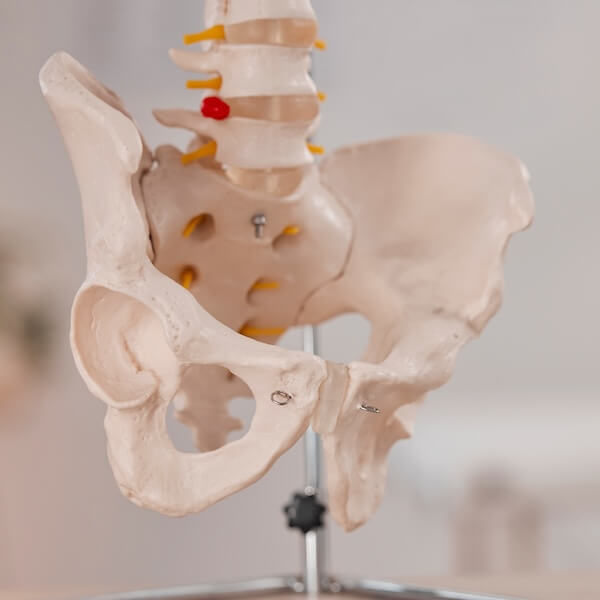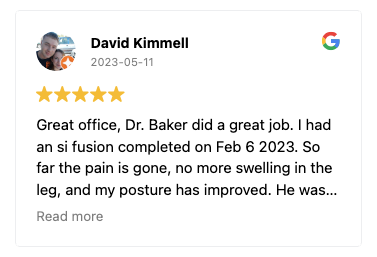How to Relieve Hip Nerve Pain: Effective Management Tips

Hip nerve pain can manifest as a debilitating condition, significantly impairing mobility and quality of life.
Whether arising from acute injuries or chronic conditions such as a pinched nerve in the hip, the pain associated with nerve issues in the hip area demands timely and effective management.
Understanding the underlying causes and exploring effective treatments is essential for alleviating discomfort and preventing further complications.
This blog post explores the various aspects of hip nerve pain, including its causes, symptoms, and a range of treatments from physical therapy to advanced medical interventions.
Addressing hip nerve pain not only helps in regaining comfort but also enhances overall bodily function, enabling individuals to return to their daily activities with ease and confidence. Seeking an experienced neurosurgeon in Dubai or Texas can help with achieving reduced pain.
Understanding Hip Pain
What Causes Hip Pain?
Hip pain is a common complaint among individuals of various ages and can be attributed to a range of factors. Among the most prevalent causes are pinched nerves and issues related to the sciatic nerves, which can be exacerbated by conditions like herniated discs, bone spurs, or the narrowing of the spine canal, all of which put pressure on the nerves around the hip joint.
Additionally, inflammation or injury to the hip joint itself can lead to discomfort and mobility issues. Pinched nerves are particularly significant because they directly affect how nerve signals are transmitted around the hip area, leading to severe pain and other debilitating symptoms. Understanding these causes is crucial as it guides the choice of treatment, ensuring targeted and effective relief.
Worried?
Request an Appointment With Dr Baker
Symptoms of Hip Nerve Pain
Hip nerve pain is characterized by a range of symptoms that can severely affect an individual’s quality of life. The most notable symptom is severe pain that can be sharp, aching, or burning in nature.
This pain might radiate from the hip down to the leg and worsen with movements such as walking or bending. Muscle weakness in the affected leg is another common symptom, along with a tingling or numbing sensation, indicating nerve involvement.
These symptoms are often persistent and can vary in intensity, sometimes becoming more pronounced at night or after prolonged periods of inactivity, significantly impacting daily activities.

What is a Pinched Nerve?
Overview of Pinched Nerves
A pinched nerve is caused when surrounding tissues, such as bones, cartilage, muscles, or tendons, exert excessive pressure on the nerve, disrupting its function. This pressure can induce symptoms like pain, tingling, numbness, or weakness. In the hip, this condition often arises from anatomical irregularities or repetitive stress injuries, leading to tissue inflammation and swelling. Understanding pinched nerves is crucial for directing effective treatments that alleviate symptoms by relieving nerve pressure.
How a Pinched Nerve Occurs
Pinched nerves in the hip commonly result from tissue compression around the nerve, often due to traumatic injuries or degenerative conditions like arthritis. These conditions may cause inflammation or narrow the pathways that nerves traverse, particularly affecting those extending from the lumbar spine to the hip. Repetitive activities or prolonged sitting can further aggravate nerve compression. Addressing these factors is essential in preventing and treating nerve entrapment.
Detailed Anatomy of Hip Nerve Entrapment
The Role of Major Nerves and Muscles in Hip Nerve Pain
The hip region is a complex area where several critical nerves pass, including the sciatic nerve, pudendal nerves, obturator nerve, and the lateral femoral cutaneous nerves. Each plays a distinct role in sensory and motor functions of the lower body, influencing everything from leg movement to pain perception.
- Sciatic Nerve: The largest nerve in the body, often affected by spinal disc issues, can cause radiating pain down the leg, known as sciatica.
- Pudendal Nerve: Primarily impacts the areas between the legs, sensitive to prolonged sitting or cycling.
- Obturator Nerve: Controls muscles in the inner thigh, susceptible to compression from pelvic injuries or tumors.
- Lateral Femoral Cutaneous Nerve: Responsible for sensation in the outer thigh, can be compressed in the groin area, leading to meralgia paresthetica.
- Femoral Nerve: Travels down the front of the thigh, controlling hip and knee movements, vulnerable to damage from diabetes or pelvic fractures.
- Gluteal Muscles: These muscles, particularly the piriformis when tight or spasmed, can compress and irritate the sciatic nerve, causing deep buttock and radiating leg pain.
Advanced Diagnostic and Treatment Techniques
To diagnose these complex conditions, physicians utilize a combination of physical examinations and imaging tests to visualize the nerve roots and spinal cord. Treatments may include:
- Active Release Technique: A specialized form of massage that targets soft tissues and trapped nerves, used to break up scar tissue and relieve compression.
- Physical Therapy: Tailored exercises strengthen surrounding muscles, increase blood circulation, and help maintain nerve signal integrity.
- Therapeutic Injections: For severe or chronic cases, injections directly at the site of nerve entrapment can reduce inflammation and pain.
Understanding the anatomy and mechanics behind nerve entrapment in the hip aids in formulating targeted interventions that can significantly improve patient outcomes and enhance quality of life.
Identifying Pinched Nerve Pain
Signs and Symptoms
Pinched nerve pain in the hip is often unmistakable, characterized by sharp, localized pain or a radiating discomfort that can extend to the lower back or down the leg. This may be accompanied by a burning sensation, a sign of nerve irritation.
Other symptoms include tingling or numbness in the affected areas, suggesting disrupted nerve function. Some individuals may also experience episodes of muscle weakness, making it difficult to perform everyday activities like walking or standing up. These symptoms can fluctuate in intensity but often worsen with certain movements or after prolonged periods of inactivity.
Diagnosing Hip Nerve Pain
Diagnosing hip nerve pain typically involves a thorough physical examination by a healthcare professional, who will assess the range of motion, muscle strength, and nerve function.
A physical therapist may perform specific tests to pinpoint the source of nerve compression. Imaging tests such as MRI or CT scans can be crucial in visualizing the internal structures of the hip and surrounding areas, helping to identify any anomalies that could be pressing on the nerves.
This diagnostic process is vital in determining the exact cause of the nerve pain and devising a suitable treatment plan to effectively address the underlying issues.
Physical Therapy for Hip Nerve Pain
Role of Physical Therapy
Physical therapy plays a pivotal role in the management of hip nerve pain, particularly pain stemming from a pinched nerve.
Therapists utilize a variety of techniques to relieve pressure on the nerve, enhance mobility, and strengthen the muscles around the hip joint.
Techniques such as manual therapy, ultrasound, and electrical stimulation can help reduce inflammation and promote blood flow, aiding the healing process.
Tailored exercise programs focusing on stretching and strengthening also support recovery by improving flexibility and enhancing the support around the nerve, effectively reducing the risk of further compression.

Exercises and Stretches

Effective physical therapy for hip nerve pain involves a series of exercises and stretches that target the muscles and tissues contributing to nerve compression.
Gentle stretching exercises can help alleviate tight muscles and increase flexibility, reducing the strain on the hip joint. For example, piriformis stretches and hamstring stretches not only enhance flexibility but also relieve pressure on the sciatic nerve, which often contributes to hip pain.
Strengthening exercises are equally important as they build the muscles that support the hip joint, potentially reducing the burden on the hip itself and preventing further nerve compression. Exercises like bridges and hip abductor strengthening can be crucial for stabilizing the hip and improving joint function.
Physical therapists may also incorporate balance and coordination activities to improve body mechanics and ensure that the hip and surrounding muscles are functioning optimally. This comprehensive approach helps not only in relieving current pain but also in preventing future episodes of pinched nerve pain.
Medical Treatments for Pinched Nerve
Medication and Injections
For those suffering from severe hip pain due to a pinched nerve, various medical treatments are available to manage symptoms.
Anti-inflammatory medications are commonly prescribed to reduce inflammation and alleviate pain. In cases where pain persists despite conservative treatment, steroid injections may be administered directly into the affected area.
These injections help decrease inflammation around the nerve roots and can provide significant relief from pinched nerve pain in the hip.
For patients experiencing chronic pain, prescription medications, including pain relievers and muscle relaxants, may be recommended to manage the symptoms more effectively. These treatments, combined with physical therapy, can improve nerve function and relieve pain, allowing patients to engage in daily activities with greater comfort.
When Surgery is Necessary?
Surgery may be considered for persistent pinched nerve pain that does not respond to non-surgical treatments.
If physical therapy, medications, and injections do not effectively relieve pain or if there is evidence of nerve damage, surgical intervention may be necessary. Hip surgery, such as decompression or discectomy, can be performed to remove the pressure on the nerve.
This option is generally reserved for cases where there is significant impairment or the risk of permanent nerve damage. A thorough physical examination and imaging tests are crucial in determining the need for surgery to ensure that all conservative treatment options have been exhausted.
Home Remedies and Lifestyle Adjustments
Maintaining a Healthy Weight
One effective home remedy for relieving hip nerve pain is maintaining a healthy weight. Excess weight can increase pressure on the hip joint and surrounding nerves, exacerbating pain and discomfort.
By achieving and maintaining a healthy weight, individuals can significantly relieve pressure on the sciatic nerve and other affected areas, reducing the severity of symptoms.
Gentle stretches and hip exercises can also support weight management efforts while simultaneously improving flexibility and strengthening the muscles around the hip, further helping to alleviate pain.
Ergonomic and Posture Tips
Adopting proper ergonomic and posture techniques is essential for individuals suffering from hip nerve pain. Prolonged sitting or standing in an improper position can aggravate pinched nerves, leading to increased pain and discomfort.
It is crucial to ensure that the lumbar spine is supported, especially when sitting for long periods. Using ergonomic chairs that support the natural curve of the spine, taking frequent breaks to stretch, and ensuring that the feet are flat on the floor can help minimize pressure on the hip region. These simple adjustments can significantly relieve pain and prevent further nerve entrapment.
Advanced Options in Nerve Pain Relief
Innovative Therapies
For those seeking cutting-edge treatments for hip nerve pain, innovative therapies such as the active release technique have shown promise.
This method targets soft tissues and trapped nerves by combining precisely directed tension with specific patient movements.
Another advanced option includes nerve blocks, which can provide significant pain relief by directly targeting the nerve roots contributing to pain. These therapies can be particularly effective for trapped nerve conditions in the hip and surrounding areas, offering an alternative to more invasive procedures and potentially reducing the need for long-term medication use.
The Role of Diet and Nutrition
Anti-inflammatory Foods
Incorporating anti-inflammatory foods into the diet can significantly impact the management of sciatic pain and other sciatica symptoms.
Foods rich in omega-3 fatty acids, antioxidants, and phytonutrients can help reduce inflammation in the body, which is crucial for alleviating pain associated with nerve entrapments and trapped nerves in the hip.
Regular consumption of turmeric, green leafy vegetables, nuts, and fatty fish can support nerve health and enhance the body's overall inflammatory response, providing natural pain relief and contributing to a healthier nervous system.
Psychological Impact of Chronic Pain
Coping Mechanisms
Living with chronic hip nerve pain can be emotionally and mentally taxing. Developing coping strategies is essential for managing the psychological impact of chronic pain. Techniques such as mindfulness meditation, cognitive behavioral therapy, and relaxation exercises can help patients manage the stress and anxiety associated with chronic pain.
Joining support groups or engaging in therapy sessions can also provide emotional support and practical advice for dealing with painful symptoms. These strategies not only help alleviate mental strain but also contribute to overall pain management, making daily life more manageable for those suffering from chronic nerve pain.
Navigating Daily Life with Hip Nerve Pain
Adapting Daily Activities
Adapting daily activities to manage hip nerve pain effectively is crucial for maintaining quality of life. Simple modifications, like avoiding prolonged sitting and ensuring to gently pull or slowly pull oneself into a comfortable position, can prevent aggravation of the pinched nerve in the hip. Employing aids like cushions for better alignment and taking frequent breaks to walk around can also help manage pain and prevent further injury. Additionally, incorporating low-impact exercises, as recommended by a sports physical therapist, can strengthen the surrounding muscles and tissues, supporting the hip and reducing the risk of future nerve entrapments.
H2: Preventing Future Hip Nerve Pain
Preventative Measures (100 words)
Preventing future incidents of hip nerve pain involves consistent practice of preventive measures. Regular physical activity to maintain a healthy weight, avoiding activities that strain the hip, and practicing proper lifting techniques can significantly reduce the risk. Employing ergonomic workplace setups and using supportive footwear also play crucial roles in preventing excessive strain on the hip and surrounding nerves. Regular check-ups with a healthcare provider to monitor the health of the hip joint and nerve condition are advised to catch any potential issues early before they develop into more significant problems.
When to See a Doctor
Seeking Professional Help
It's crucial to consult a healthcare provider if you experience severe pain, sudden worsening of symptoms, or if conservative treatments fail to provide relief. Symptoms such as a sharp increase in pain, loss of sensation in the affected leg, or signs of nerve damage indicate the need for professional evaluation. Healthcare providers can offer comprehensive assessments, using imaging tests to evaluate the spinal discs, nerve roots, and surrounding tissues, and determine the appropriate treatment plan, which may include physical therapy, medications, or in some cases, surgery.
Conclusion
This blog post has explored various aspects of managing and treating hip nerve pain, from understanding the condition and recognizing symptoms to exploring treatment options and preventive strategies.
For individuals suffering from this condition, it's essential to be proactive in seeking out effective treatments and making lifestyle adjustments to manage symptoms and improve overall quality of life.
Remember, while managing hip nerve pain can be challenging, many resources and treatment options are available to help you lead a pain-free and active life. Don't hesitate to reach out to healthcare professionals to explore these options and find relief from hip nerve pain.
Dr. Abdul Baker - An Expert Neurosurgeon in Texas
Every neurosurgery has its complications; thus, a patient must choose the best neurosurgeon for himself. Dr. Abdul Baker is one of the most experienced and qualified neurosurgeons in Texas, treating patients for more than 16 years. People in Sherman, Plano, and nearby areas trust him for every kind of neurosurgery due to his surgical procedures’ 100% success rate. You may visit him if you need any consultancy or treatment regarding your brain and spine disorders.


Dr. Baker specializes in neurosurgery, neurosurgical spine surgery, neurotrauma, brain tumors, spinal tumors, and peripheral nerve damage treatment.









